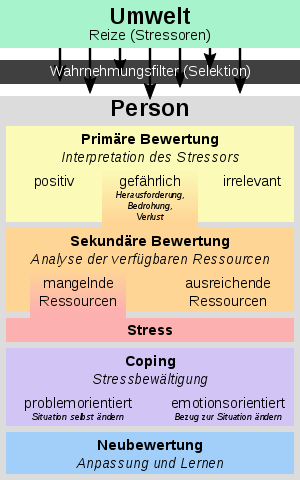Richard Lazarus
Richard S. Lazarus (born March 3, 1922 in New York , † November 24, 2002 in Walnut Creek ) was an American psychologist and leading proponent of the theory of emotions in cognitive evaluation. He developed a theory of stress management , which was named after Lazarus as the stress model , and made contributions to the cognitive turn .
Life
Richard S. Lazarus studied at the City College of New York in 1942 . After three and a half years of service in the Army, he received his doctorate from the University of Pittsburgh in 1948 . Thereafter, Lazarus taught until 1953 at the faculty of Johns Hopkins University and then until 1957 at Clark University . Lazarus then worked at UC Berkeley until he retired in 1991.
Richard Lazarus had two children with his wife Bernice. He died on November 24, 2002 after falling at his home. His estate includes over 150 scientific publications and twenty of his own works.
research

When Lazarus began his research on stress and emotions at Johns Hopkins University, there was little interest in these subjects other than the military. At UC Berkeley, Lazarus also used films in his studies to provoke stress reactions or emotions in the test subjects. He documented how the test subjects rated what they perceived under different conditions (e.g., intellectualized, trivializing comments were added). Lazarus found out that the different interpretation (evaluation) of what is perceived has an impact on the strength of the stress and thus its coping.
Richard Lazarus highlighted the importance of dealing with stress. This has a decisive impact on physical, social and emotional well-being. He also found a correlation between stress and coping (stress management). If coping works, the stress is controlled and managed. If coping doesn't work, the stress gets out of hand and can potentially result in a mental disorder .
After he published a scientific work on psychological stress and coping processes in 1966, this sparked interest in this topic on the academic side for the first time. His research results were also carried into the fields of sociology, anthropology and medicine.
In his 1999 work Stress and Emotion: A New Synthesis , Lazarus made the relationship between stress, emotions and feelings clear. He also emphasized everyday stress - contrary to the prevailing view at the time - as a cause of human suffering. He paid particular attention to the evaluation of events and the subsequent reaction.
Awards
- 1969–1970: Guggenheim grant
- 1984: Recognized by the California Psychological Association
- 1992: Distinguished Scientific Contribution Award from the American Psychological Association (see: http://www.apa.org/about/awards/div-29-distpsyc.aspx )
- 1988: Honorary doctorate from Johannes Gutenberg University Mainz
- 1995: Honorary doctorate from the University of Haifa .
Publications
- 1984: Stress, Appraisal and Coping. Together with Susan Folkman.
- 1991: Emotion and Adaptation. Oxford University Press, New York NY u. a. 1991, ISBN 0-19-506994-3
- 1994: Passion and Reason. Making Sense of our Emotions. Together with Bernice Lazarus.
- 1998: The Life and Work of an Eminent Psychologist. Autobiography.
- 1999: Stress and Emotion. A New Synthesis. Free Association Books, London 1999, ISBN 1-85343-456-6 (reprint).
Web links
- Obituary on berkeley.edu (English)
- Obituary on nytimes.com (English)
- In Memoriam: Richard S. Lazarus (translated from English)
Individual evidence
- ↑ Richard J. Gerrig, Philip G. Zimbardo: Psychologie - 18th, updated edition (2008), p. 462
| personal data | |
|---|---|
| SURNAME | Lazarus, Richard |
| ALTERNATIVE NAMES | Lazarus, Richard S. |
| BRIEF DESCRIPTION | American psychologist, stress researcher and university professor |
| DATE OF BIRTH | March 3, 1922 |
| PLACE OF BIRTH | new York |
| DATE OF DEATH | November 24, 2002 |
| Place of death | Walnut Creek |